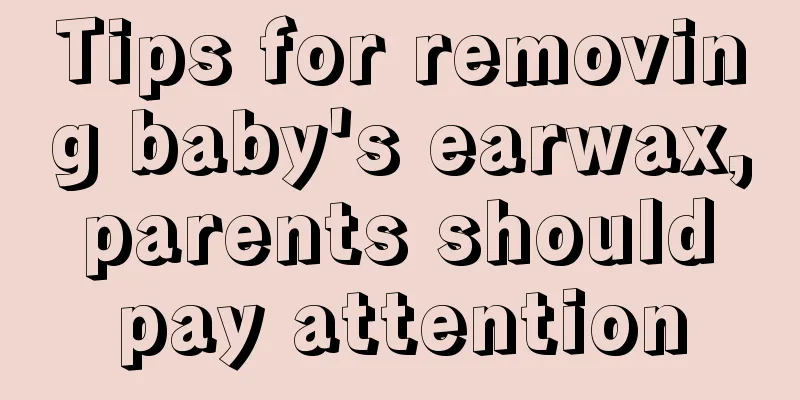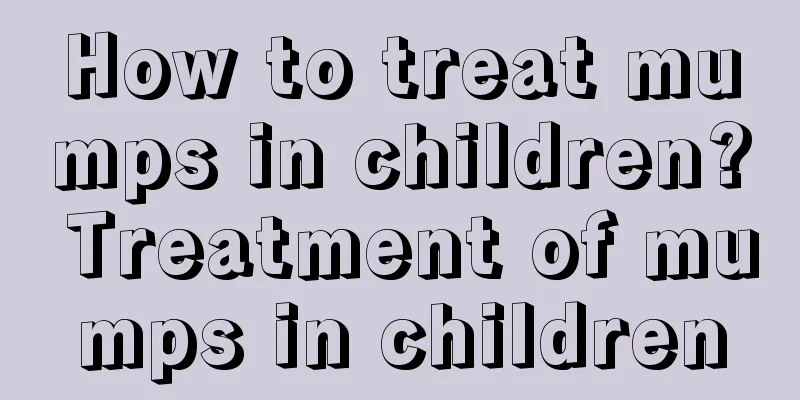How to relieve baby's teething discomfort

|
Every newborn baby will feel very painful when the tooth emerges from the gum mucosa. Children often drool, become irritable, have a fever, and have itchy gums. The increase in saliva secretion in the mouth can affect the child's digestive system and cause vomiting. These are all manifestations of teething discomfort in babies. How to relieve the discomfort of teething in babies is a question that every parent is very concerned about. I also hope to understand more and have more methods based on the actual situation. 1. Drooling When your baby is teething, excess saliva will be produced in the mouth, causing the baby to drool frequently. We should help children wipe off their saliva in time, because saliva contains digestive enzymes and other substances, which may irritate the baby's skin to a certain extent, causing redness and peeling of the skin, and in severe cases, swelling. In addition, saliva on the skin can cause itching and make the baby feel uncomfortable. So we need to prepare a piece of soft cotton cloth and wipe the child's saliva frequently. Be sure to be gentle when wiping, because the baby's skin is very delicate and if you use too much force, it may scratch the skin. If the area where the baby drools becomes red, you can apply some baby ointment to reduce the irritation of the saliva to the skin. 2. Itchy gums When babies are teething, their gums often itch, and they will sometimes reach in and scratch. We must watch our children and not let them put their hands in their mouths. This is not only unhygienic but also affects the growth of their teeth. In order to prevent children's gums from itching, we can wipe the baby's gums with gauze dipped in cold water every day, which can effectively relieve the discomfort during teething. Make sure the gauze is clean and wipe gently to avoid hurting your child's gums. In addition, we can also buy some products such as teethers to train the baby's gums. Many teethers on the market are specially designed to relieve the discomfort of babies during teething. You can buy these products for your children to chew on, which can not only relieve itchy gums but also exercise their chewing ability. 3. Irritability Babies usually cry and become fussy when they are teething. At this time we can give him a facial massage to relax his muscles, make him feel comfortable and reduce crying. You can also buy a teething stick for him to chew on, which will give him something to do and he will usually calm down. You can also prepare some toys for him to distract him and make him forget the discomfort of teething. 4. Gastrointestinal discomfort When babies are teething, the excessive saliva secreted in their mouths can affect their gastrointestinal function, and they often experience vomiting, diarrhea, and other symptoms. At this time, we can give the baby some warm water to drink, or take some antidiarrhea medicine specifically for babies. At the same time, we must also pay attention to the hygiene of children's oral cavity to reduce the invasion of bacteria and avoid causing other diseases. It is best to clean your child's mouth every day. When cleaning, the mother sits on a chair, picks up the baby and places him on her lap, with the baby's head tilted back slightly. Then use clean gauze dipped in cool water to gently wipe the baby's gums and growing teeth. 5. Increased body temperature Your baby's body temperature will rise slightly when teething, so your baby may feel a little warmer than usual. However, as long as the child's body temperature does not exceed 37℃ and his appetite is good, there is generally no abnormality and no treatment is required. You can give your baby more hot water. But if the temperature exceeds 37℃, the child may cry and refuse to drink milk, and you should check it immediately. With some basic understanding and coping methods on how to relieve the discomfort of teething babies, parents don’t have to panic. You can look more, observe more, and try more. When dealing with how to relieve your baby's teething discomfort, you must be more patient and let your baby grow up healthy and happy. |
<<: Why does the child's head sweat?
>>: How to Rehabilitate Athetoid Cerebral Palsy in Children?
Recommend
What causes projectile vomiting in babies?
Parents are more worried about infants' proje...
What's going on when a child complains of dizziness?
The physical health of children during their grow...
How to treat chickenpox
Varicella is a relatively common disease, and chi...
What to do if the fontanelle closes late
Late closure of fontanelle usually comes from sev...
What to do if your seven-year-old child has trouble sleeping
My child is seven years old this year. His sleep ...
Why does my child have bad breath when he wakes up in the morning?
Most of the time, babies have bad breath because ...
What to do if the baby is in a hurry to eat
There are actually many reasons why babies need t...
The reason why baby's nose is yellow
A baby's yellow nose is a very common disease...
Can children eat grapes when they have a cough? Can children eat grapes when they have a cough?
Cough is one of the most common symptoms of influ...
Best height increase pills
Some people are very dissatisfied with their heig...
The child shakes his head and has a headache. What's going on?
With the vigorous opening up of the country's...
What are the medicines for clearing heat and detoxifying in children?
As people's nightlife becomes more and more a...
What to do if children keep coughing
Children's physical health is an issue that p...
How to get rid of jaundice by sunbathing?
Neonatal jaundice is a very common disease, espec...
What should I do if my three-year-old child has a toothache?
Dental care is very important for adults, the eld...









